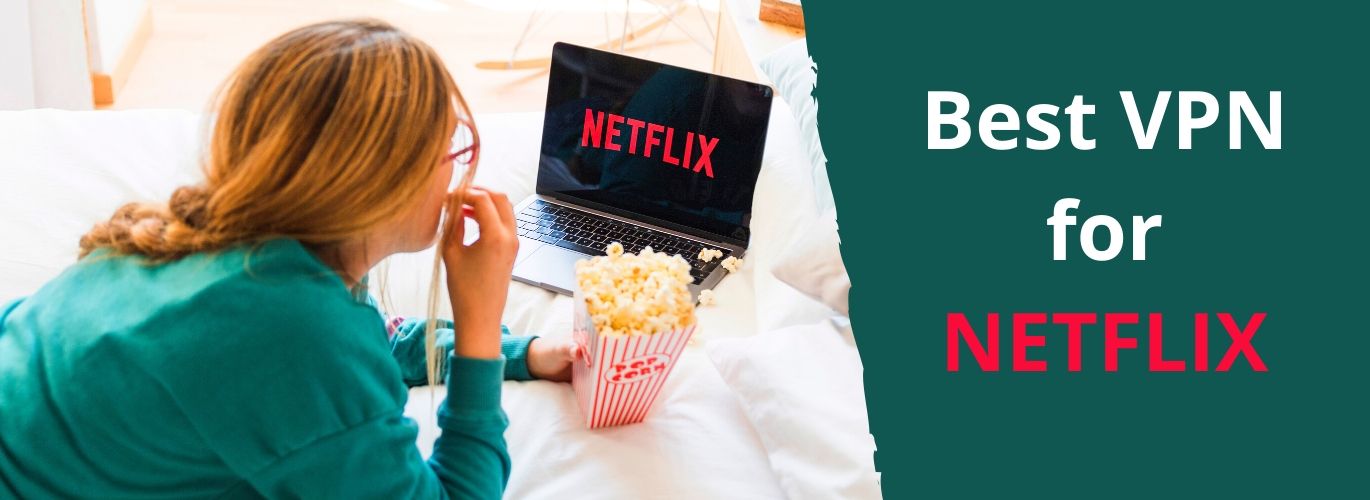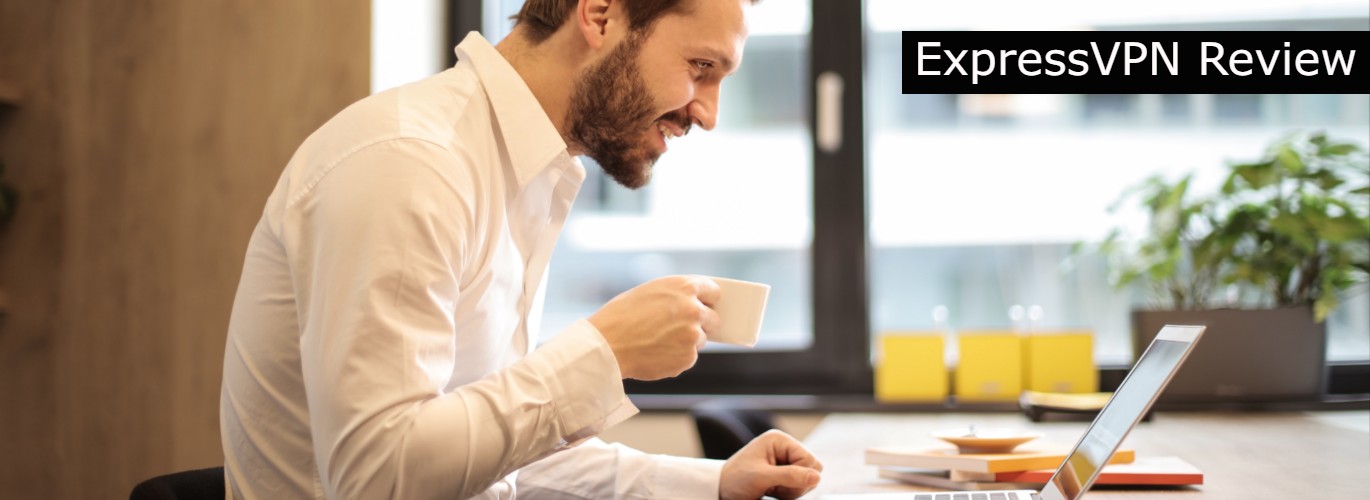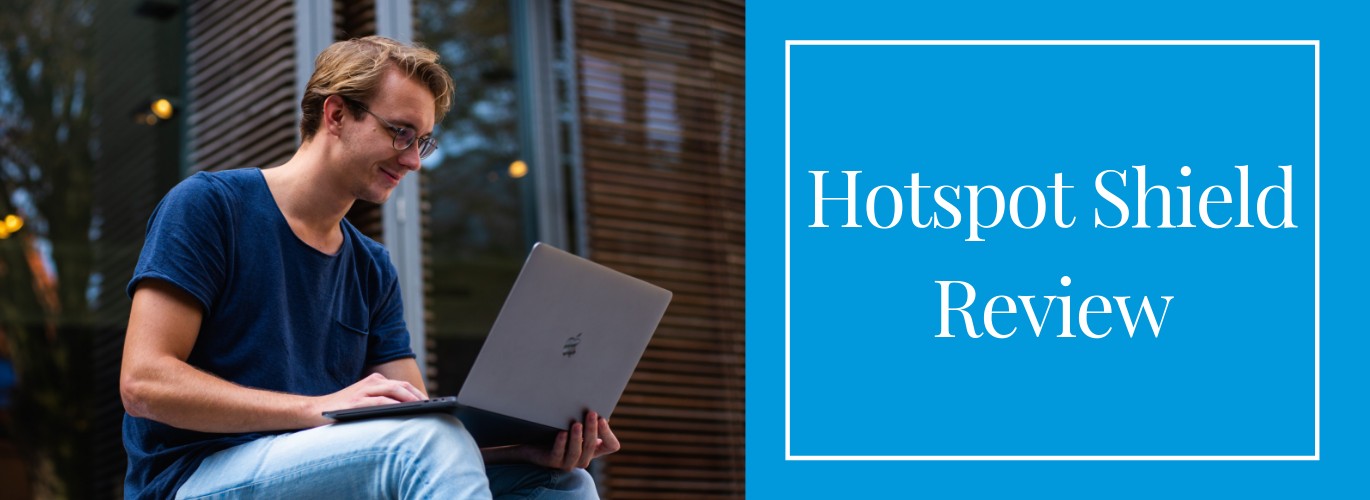
To say Hotspot Shield is popular, or well-known, is an…understatement, to say the least.
Their website says this:

Which is INSANE.
I’ll admit to being a little skeptical. That number sounds a little too high—does it include multiple installs by the same account, accounts made by the same people, etc?
(I’ve actually got some comments on that number, but you’ll have to keep reading!)
But even if only a FRACTION of that is true, Hotspot Shield would still be one of the MOST popular VPNs around.
Now, it’s not just Hotspot Shield’s popularity that makes it eye-catching.
It’s been around since 2005—and as most VPNs are less than 10 years old, this makes Hotspot Shield a veteran of the VPN industry.
BUT that’s STILL not all of what makes Hotspot Shield such a big name VPN.
Aside from being old and tremendously popular, it was used widely by protestors and dissidents during the Arab Spring.
AND…
It’s free.
At least, partly.
Now, as you can imagine, there’s A TON of stuff to unpack here: is it a genuinely good free option, or sketchy?
Is it good if I just want to stream, and I’m not an activist? Is it also good for activists? Why should I pay for it?
So on, and so on. Hotspot Shield is so well known AND is so accessible that if you’re interested in VPNs, you NEED to know whether it’s worth your time or not.
Luckily, I love VPNs and I’ve tested Hotspot Shield thoroughly. And in this review, we’re going to get to the bottom of what really is good and bad about Hotspot Shield.
I’ll start with one of the most important things for a VPN to nail:
Performance
Yep. Performance is a big one, and for good reason:
VPNs almost inevitably slow down your internet speeds a bit once activated. So you want this to be as minimal a disruption as possible.
Presumably, Hotspot Shield would do great here—since it’s so popular. Let’s see…
I was hanging out at my favorite café when I decided to test Hotspot Shield’s internet speeds more formally.
Here’s the café’s internet speed normally:

And this was with Hotspot Shield on:
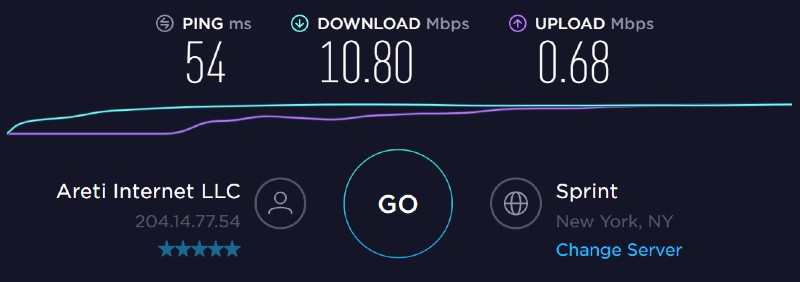
Clearly, Hotspot Shield has FANTASTIC speeds.
As far as VPNs go, this is definitely one of the best speed tests I’ve seen. Later tests have more or less shown the same results.
So far, so good. But suppose you wanted to test out Netflix? No doubt a lot of Hotspot Shield’s popularity is from people looking to do just this.
So I decided to switch my location to Singapore to see if Hotspot Shield could give me Singaporean Netflix:
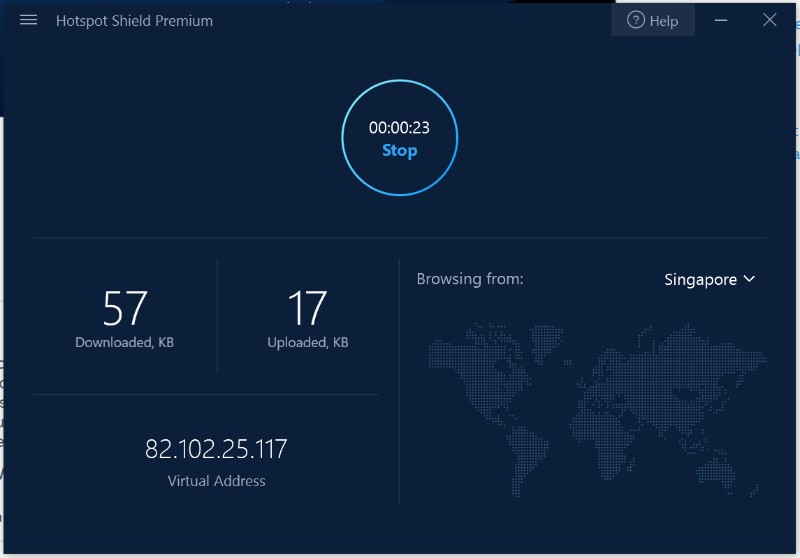
Once I was connected, I logged onto Netflix and:

It worked FLAWLESSLY!
I was impressed by just how fast it was—despite connecting to a server halfway around the world, Netflix was hardly slower than it normally is for me at home.
So far, Hotspot Shield is doing wonderfully.
But suppose you want to torrent something—not all VPNs are super file-share friendly.
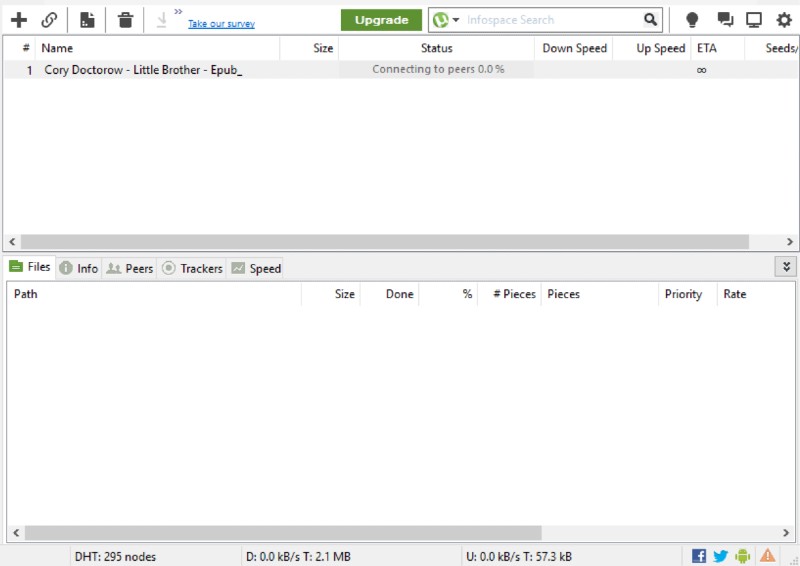
I waited forever and it just never downloaded.
And you know what? I even did that using my home internet and while connected via Ethernet. Plus it was just an ebook.
So that was disappointing. But I figured—probably a problem with the file itself.
So I decided to get the same book as an audiobook. Larger size, but it shouldn’t take too long anyway, right?!
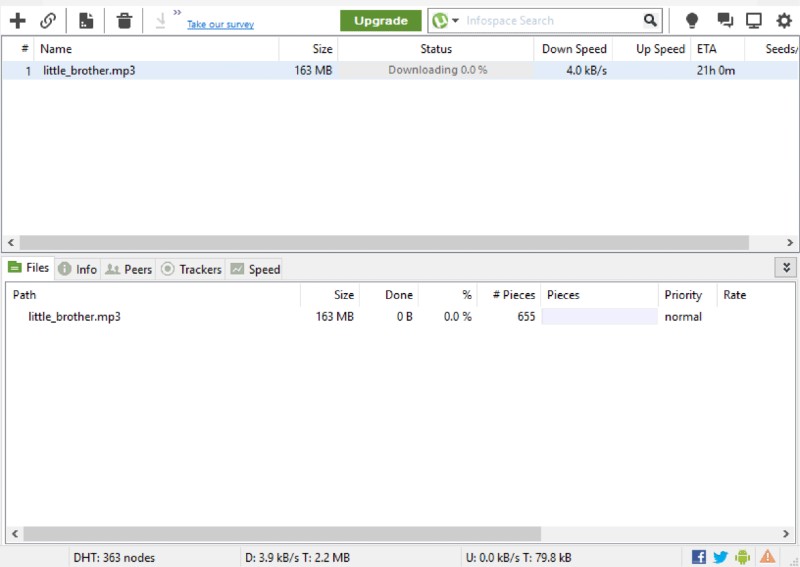
Right…
Now, would it actually have taken 21 hours? No, of course not. But it would have taken WAY longer than it should have.
I tried multiple locations and even different torrent files. But it was never very fast—even though I was only ever attempting to download relatively SMALL files.
So my personal experience has been that Hotspot Shield hasn’t been the best for torrenting.
So I think it’s time to sum up the overall take of Hotspot Shield’s performance:
It’s true, torrenting and file sharing haven’t been reliable, in my experience.
BUT, streaming in general (not just Netflix) and normal internet activities are EXCELLENT.
So overall performance is GREAT, but there’s a major flaw where torrenting is concerned.
Now, the story hasn’t been concluded yet, of course. Let’s take a look at something Hotspot Shield EXCELS at:
Ease of Use
Let me be REALLY honest about ease of use for a moment:
Pretty much every VPN is easy to use.
Is there a range? Sure. But even the more complex VPNs are pretty easy to figure out to anyone who’s used to using the internet and software.
So why even bother taking a look right?
Well first of all, ease of use isn’t just good for beginners. People who don’t need beginner-friendly help still benefit from user-friendly apps by saving TIME and having a generally more enjoyable experience (sometimes).
And secondly, Hotspot Shield is ALL ABOUT being easy to use.
So how does Hotspot Shield stack up to its own goals?
I’ll start at the “beginning”:
With the installation and set-up process.
Purchasing a plan is super easy. It’s exactly what you’re used to for buying basically anything online.
Once you’ve done that, you can begin your download:
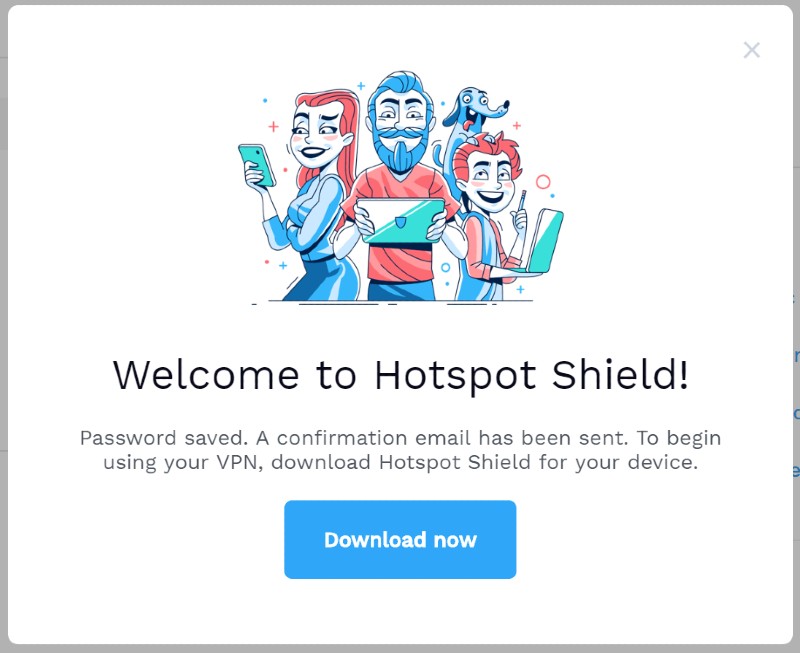
I found the download process didn’t take that long:
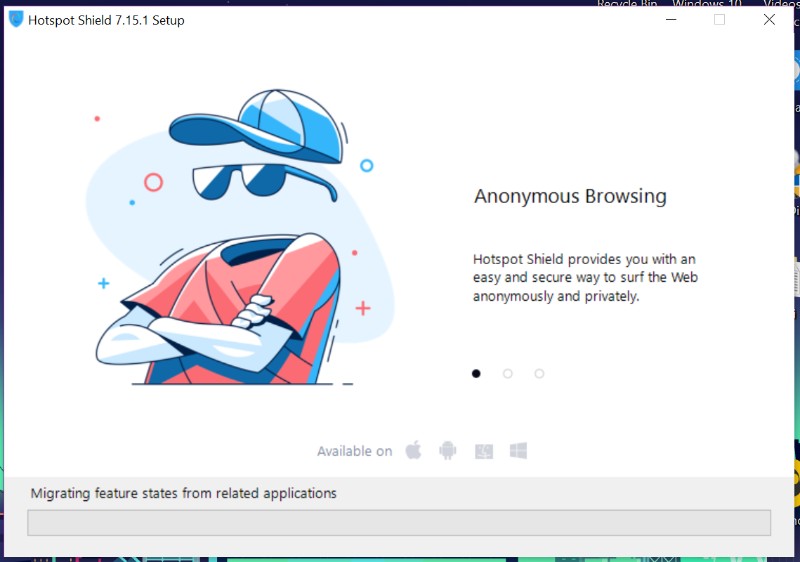
Once you’re all set up, the application is REALLY straightforward:
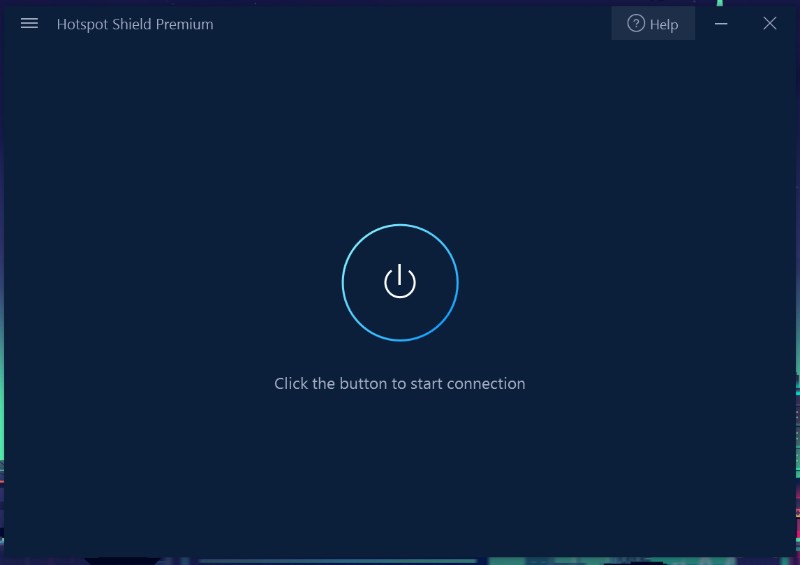
Do you see what I mean when I said earlier that Hotspot Shield has a big strength in user-friendliness?!
I mean, it’s just an “on” button.
Now, you get a few more options by clicking the icon with three bars in the upper left corner:
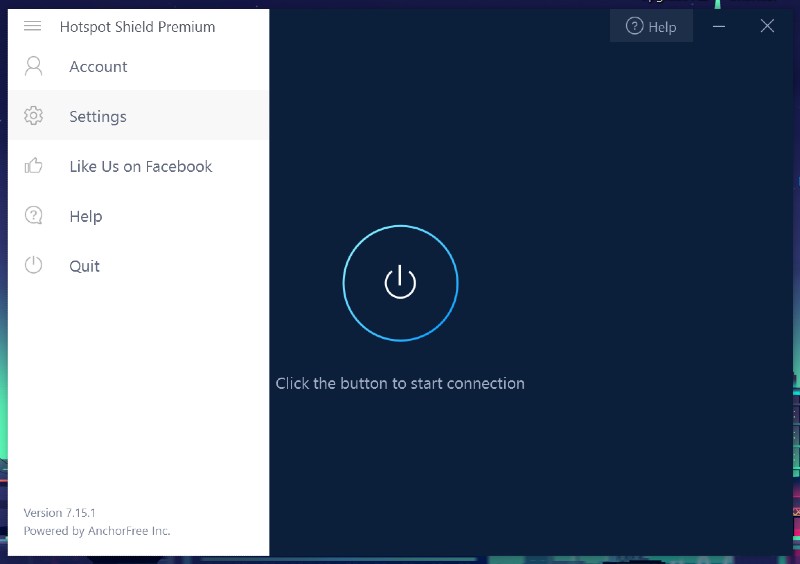
And all that stuff is pretty easy to grasp. None of those options are super complex, by the way.
Anyway, once you’ve decided to activate that VPN:
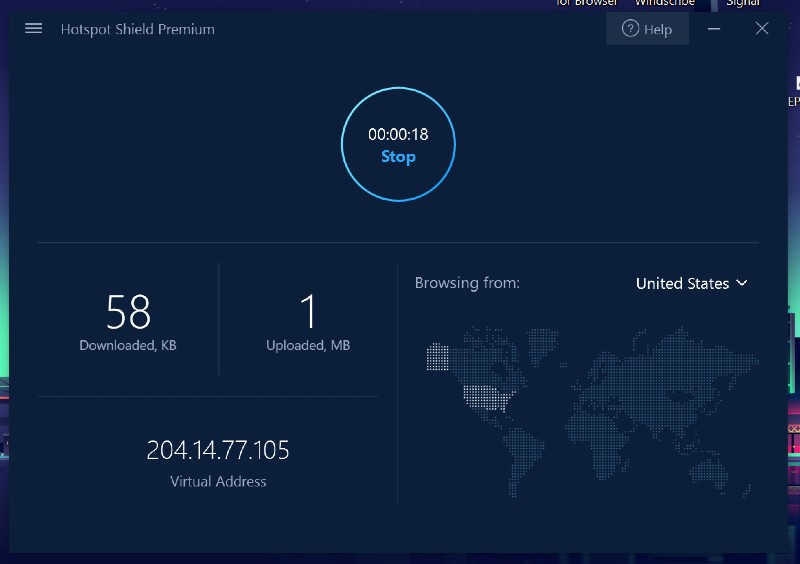
As you can see, things stay pretty simple.
You can see some basic metrics, including your new IP.
This is the only area where I feel the ease of use gets OVERBEARING:
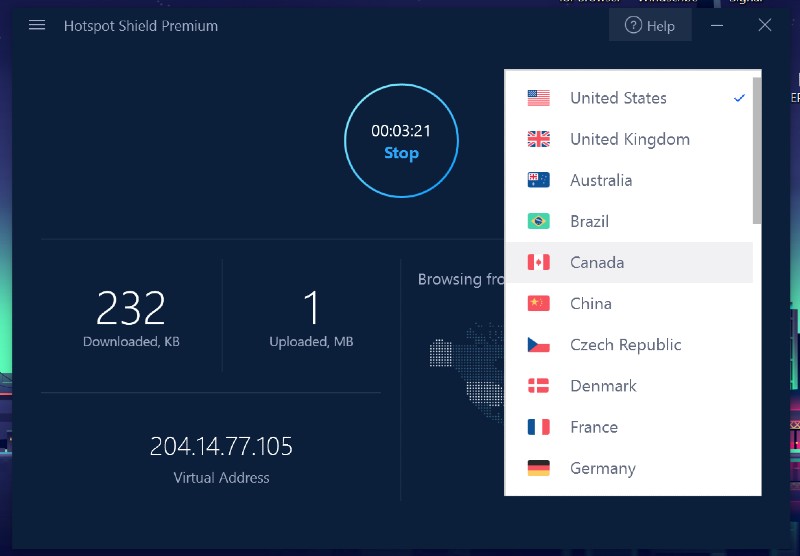
I know what you’re thinking—how is that overbearing?
Well, while it’s cool to be able to EASILY switch your location from a little drop down menu…
You can’t go any more SPECIFIC than that.
Now, a lot of VPNs will let users CHOOSE specific cities WITHIN a country, which in my mind is only reasonable if you’ve got a ton of servers.
But Hotspot Shield is one of the VPNs that only lets you choose a country, not a place within a country.
In that sense, it’s really limited, and the user-friendliness actually TAKES AWAY from the features.
Now, overall, it’s pretty clear Hotspot Shield is very easy to use. In fact, it’s definitely one of the EASIEST VPNs around.
So if you’re into that, then Hotspot Shield is looking good for you!
But of course, there are some crucial elements you NEED to know before you can make your decision:
Pricing and Features
Pricing and features are hugely important. Aside from performance, everyone wants to get a good price out of what they purchase.
Now, good DOESN’T necessarily mean “cheap.”
It means getting your money’s worth. Part of that includes what we’ve already covered—performance and user-friendliness—but a lot of it also includes the features…what you can DO with the VPN software.
I’ll get to that in a sec. First, we’ll look at the prices.
For that…let’s just be honest about Hotspot Shield’s popularity for a minute:
As you’ve seen, it’s a great performer. So that’s definitely part of it. But we all know the REAL reason it’s SO popular:
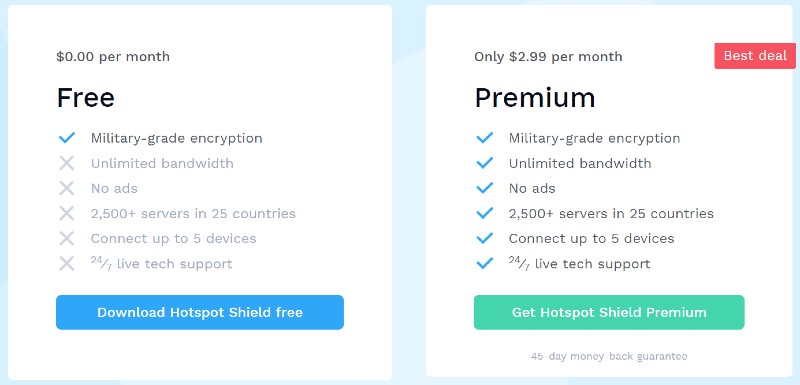
It has a FREE option.
Now, that sounds fantastic, but a quick glance at the comparison quickly shows some important limits.
The more important limits are that you don’t get unlimited bandwidth, as many devices with a single account, and as many servers/locations.
Which is to be expected of a free VPN option—we can’t really fault Hotspot Shield here.
But here’s where we can:
Advertisements. The free version is supported by ads.
I don’t want to spend too much time on this here, because I’ll have more to say in the security and privacy section, but briefly:
This sort of defeats the purpose of a VPN. The essential goal of a VPN is to anonymize you and encrypt your traffic.
The BYPRODUCTS of this are that you can access content you wouldn’t be able to otherwise, but it’s not exactly the “goal.”
So having a free VPN that is supported by ads is on one hand, possibly contrary to what a VPN should be about.
On the other hand, it’s a realistic option: many people just want a VPN to unlock or unblock content, and are perfectly willing to see advertisements in the process.
So ultimately, I’ll consider the free plan a PLUS—it’s optional and at least it exists as an option for those who want it.
But the REAL substance of Hotspot Shield is the stuff you’ll pay for.
And here’s what you’re looking at:
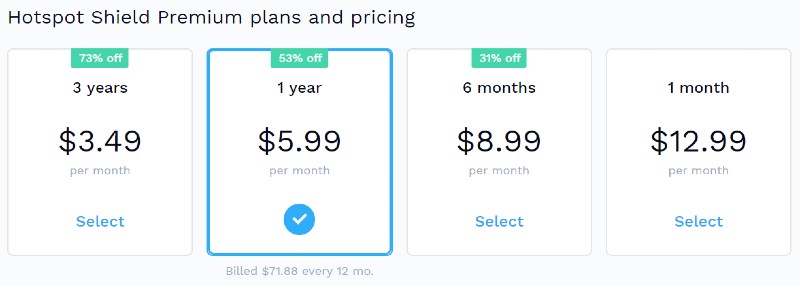
As far as prices go, they’re okay.
I’d say they’re a little on the higher side: especially the monthly price and the price for a 6-month term.
But overall, it’s nothing so out of line with average VPN pricing.
So what’s important now is what you GET for those prices—remember, we already know the performance is good.
Note: the features aren’t the EXACT same for every platform. There are some differences, but fairly minor.
Anyway, I’m going to be real honest with you here:
Features are NOT one of Hotspot Shield’s strong points.
And that’s okay! Not every VPN NEEDS to have a ton of features or settings. A lot of people just want a simple on-off button.
And Hotspot Shield is more or less that.
The existing features you’re looking at are pretty basic, and you mostly handle them in the settings:
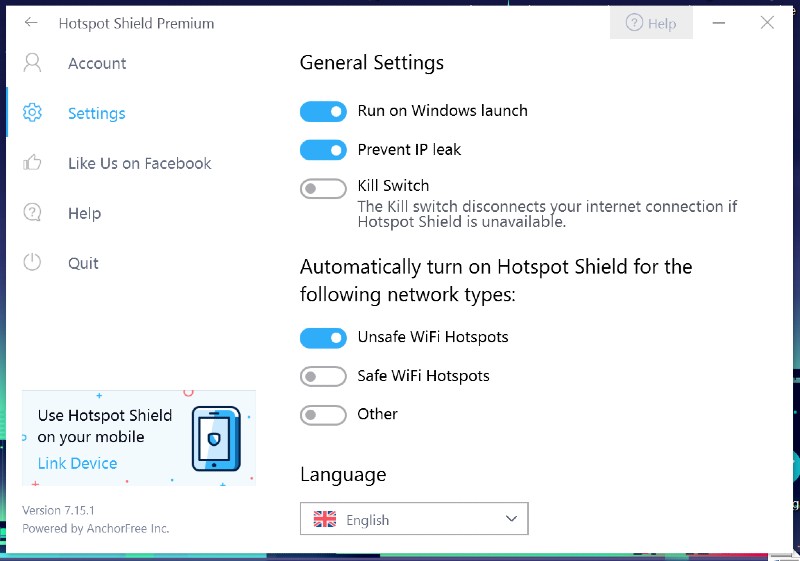
In fact, the only real features of note are the IP leak prevention and the internet kill switch.
But both of those are available on nearly every VPN nowadays, and you can’t control anything else about them.
So not only is there a small NUMBER of features, but the existing ones are really BASIC in how much you can control them.
So aside from that, we have to turn to the REAL basics of the VPN service:
You can hook up to 5 devices with a single account, you get unlimited bandwidth and server switching, and “full” performance.
Which basically means normal performance.
You also get full access to Hotspot Shield’s servers. Here’s the thing about Hotspot Shield’s servers:
There are A LOT. Seriously, we’re talking about over 2,500 servers, which is definitely one of the largest VPN server networks.
But here’s the downside:
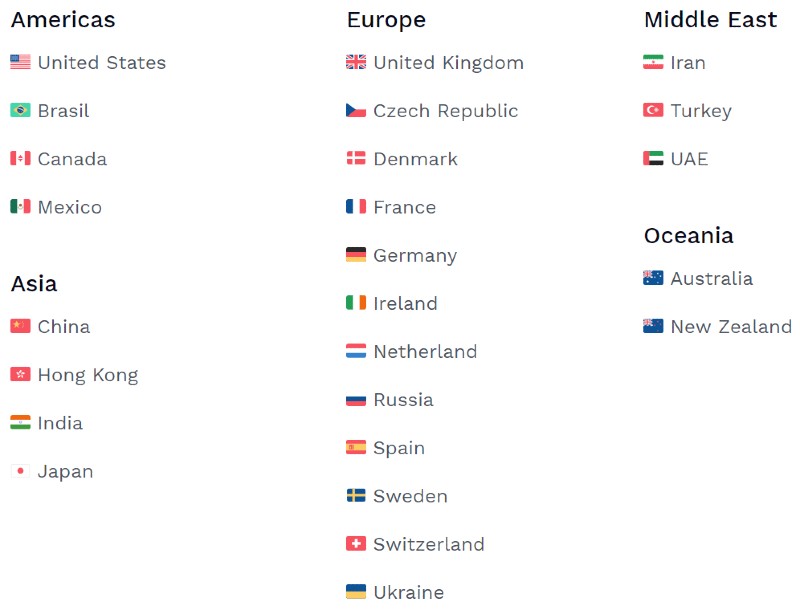
I know—how is that a downside? Look at all the places you can access!
Well…look at all the places you CAN’T.
Because the truth is, as large as Hotspot Shield’s server count is, the number of countries you can actually access is relatively low.
So that’s too bad.
Now, you might be wondering—is that really it?
Technically, that’s not all. That’s all you get by DEFAULT with a paid account.
If you want to pay EXTRA, you can get a couple add-ons.
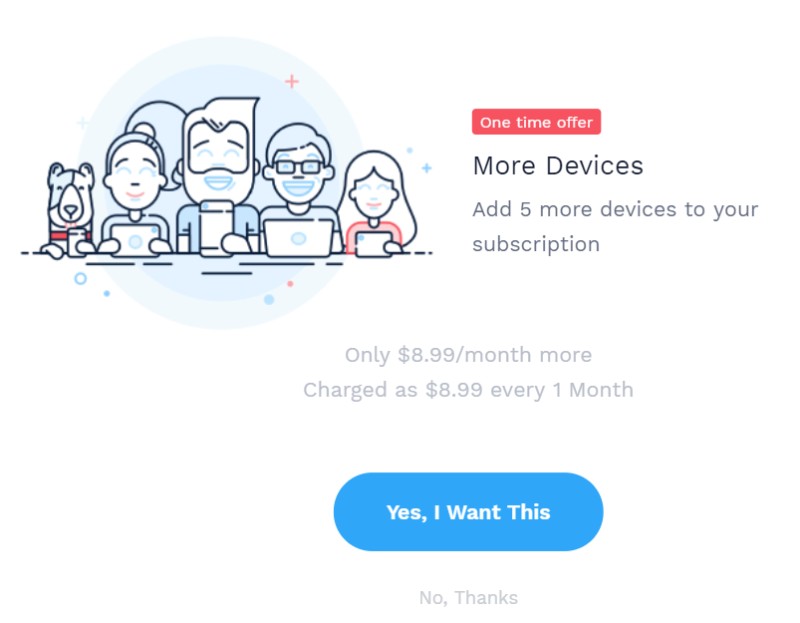
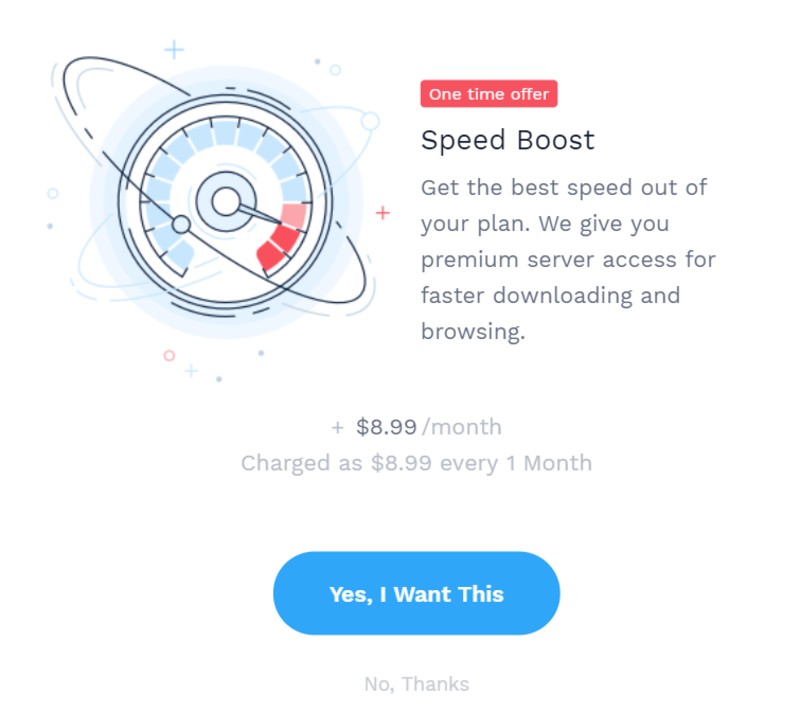
Now, I was SUPER annoyed by these.
Why?
Because I saw them when I was trying to finish my checkout.
I didn’t see much mention of them on the normal website. They show up as upsells when you’re already trying to buy your plan.
Which I find infuriating…but at least the option is there?
So if you need to, you can boost your performance with premium servers, or add devices to your account.
The extra devices I get—I find the performance boost an annoying extra feature. Great performance should be a default…but that’s just my thinking.
Now, aside from those extras, that really is it.
At bottom, Hotspot Shield’s features are exactly the basic features of just about every major VPN, but with a little less control.
The prices are decent—a bit above average for the premium options, but there’s also a free plan with some limits.
Because there aren’t a lot of settings or features, you basically have to evaluate the prices based on the importance of the other factors, such as performance and ease of use.
And this:
Customer Support
When a VPN is super popular, customer support can go either way.
Some VPNs, especially the ones that market themselves as apps for mobile devices, don’t really have much customer support.
But others invest more in it, so that any customer can reliably expect help at a given time.
Where does Hotspot Shield stand?
A bit more in the former category.
I’ll show you what I mean.
One of the cool things about the Hotspot Shield app is this:
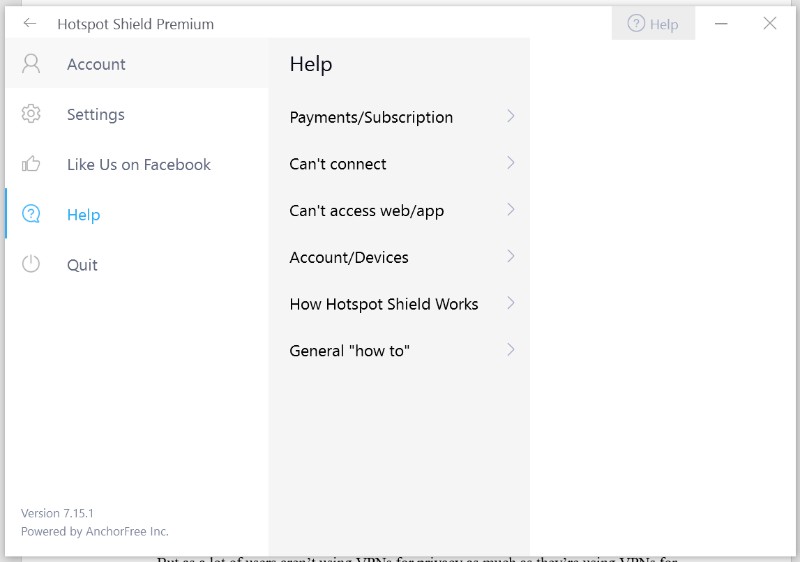
You can access more of the customer support within the app itself than you usually can with other VPN apps.
Most VPN apps, if they have a support or help option, will basically give you a form to start a support ticket.
Which is good, but Hotspot Shield’s app lets you actually look at the informational material and help articles too:
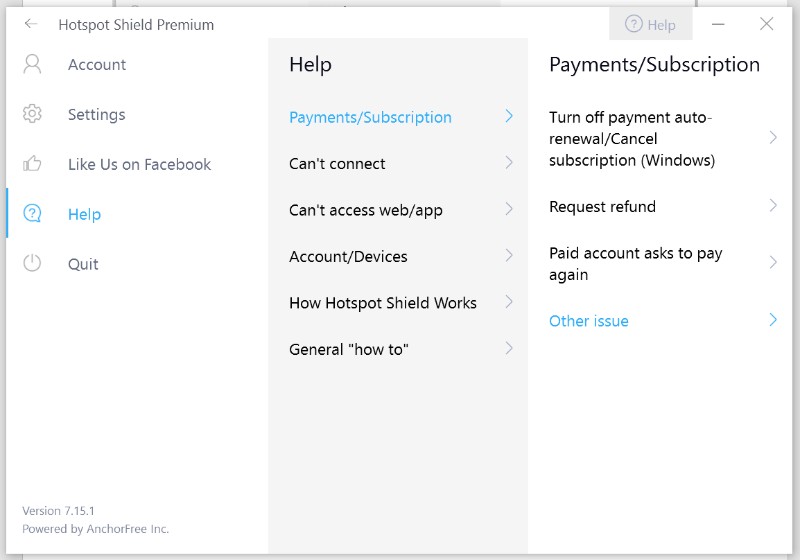
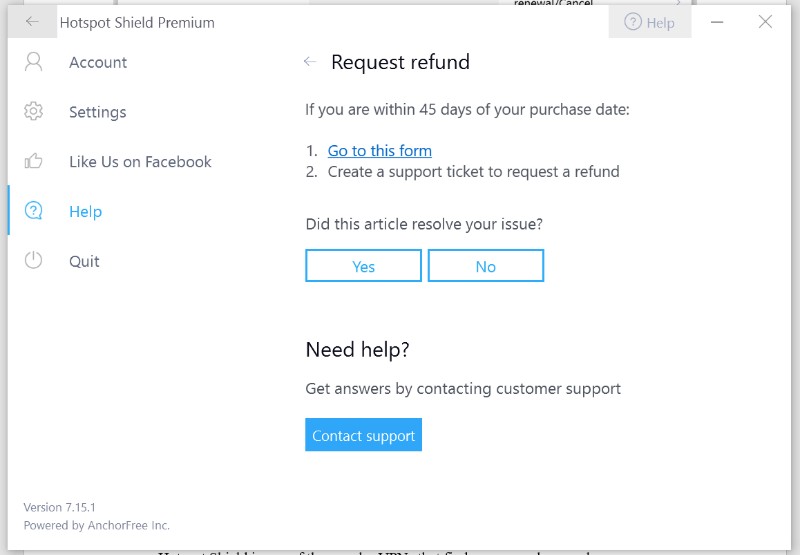
And if you still need to contact support, you can do that pretty easily by clicking the button at the bottom.
Unfortunately, clicking this will open up your browser.
It’s not a big deal I guess, but personally I enjoy keeping things in the app as much as possible—it’s a little less of a hassle.
Anyway, it’s true the articles aren’t always super detailed. That’s too bad. But at least they’re there.
And honestly, sometimes you appreciate to-the-point and easy to look at answers within the app itself.
Now, when you actually go onto Hotspot Shield’s support page:
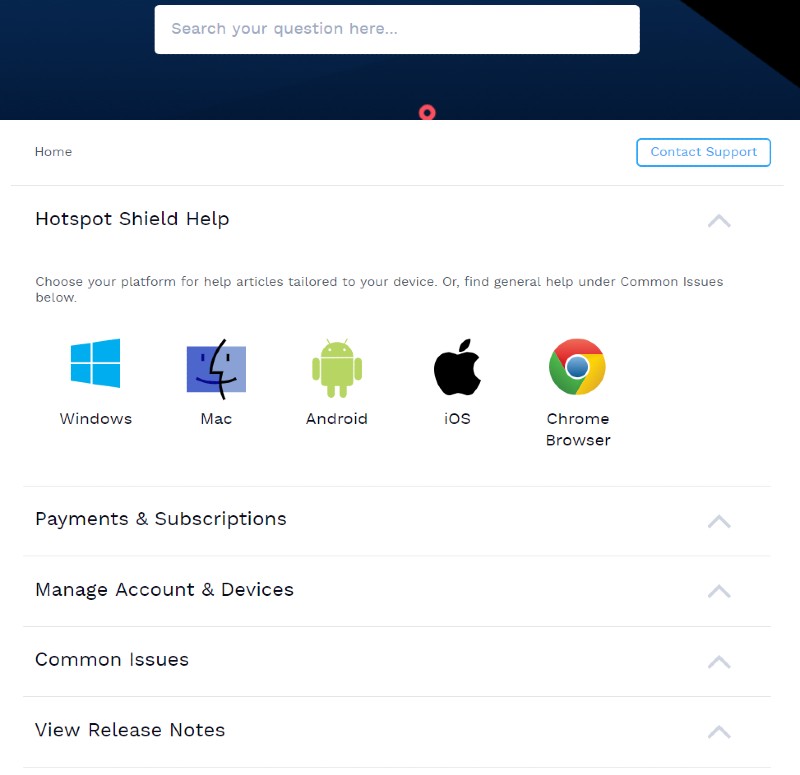
Things are largely the same as what’s within the app itself.
The informational material and articles are largely the same. However, the website DOES have more articles to look at:
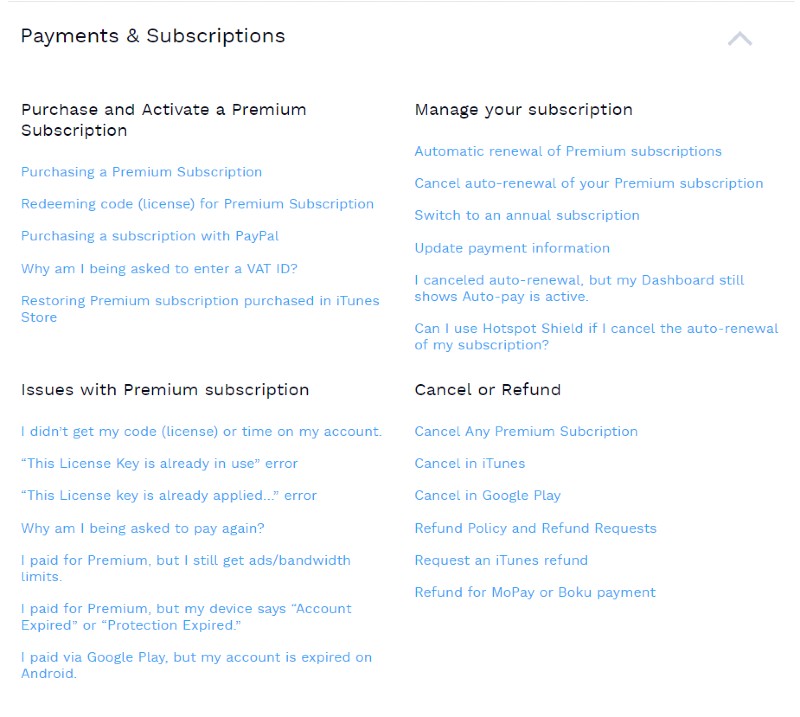
Compare this to the articles for the same section within the app itself. Big difference.
I think it’s annoying the onsite info isn’t organized the same way as it is in the app, but that’s a minor concern.
So I’m not super impressed with the informational material, but it’s still essentially good.
If you want to contact support on the site, you can submit a support ticket:

Or you can use the live chat.
But here’s the honest truth about the live chat:
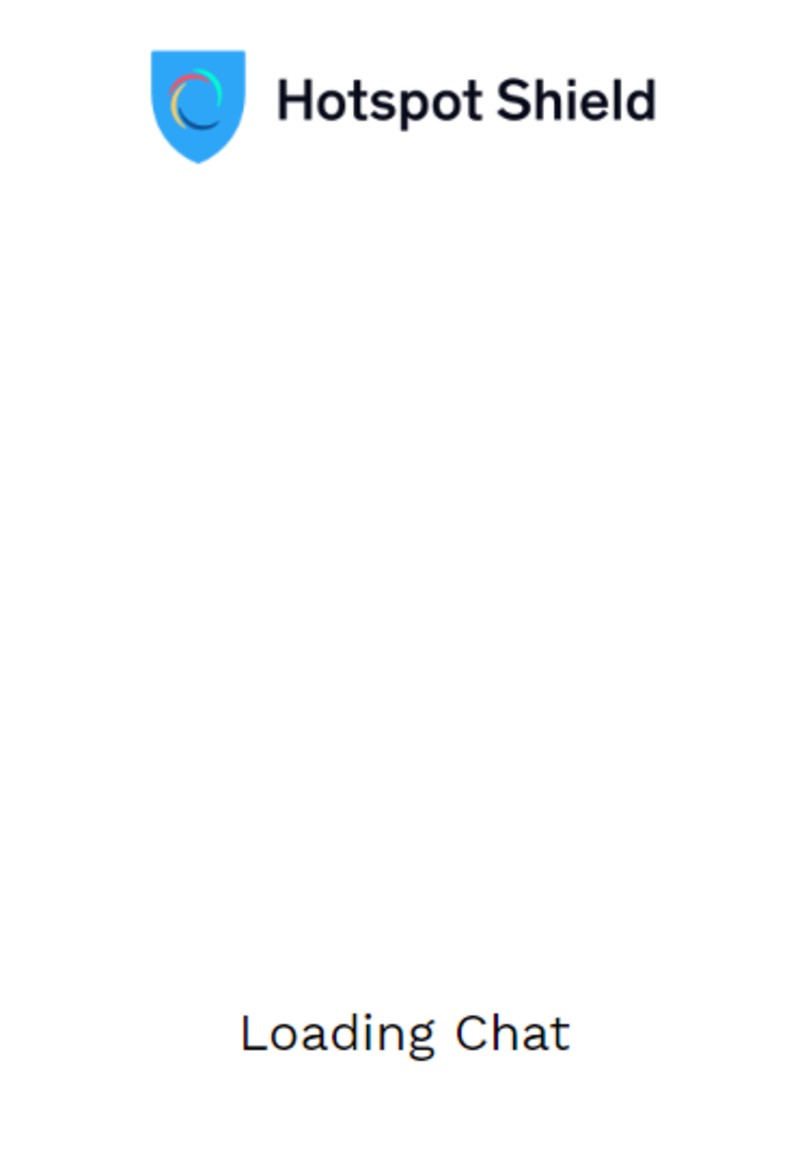
Whenever I’ve tried to get to the chat by using the “contact support” button in the app itself, I just get a loading page that NEVER LOADS.
Okay, no problem. Just go to the website directly and find the chat, right?
Uh, no. When I go to the support page, and click “contact support,” I just go to the ticket request page.
So I Googled it, and found this recently updated help article:
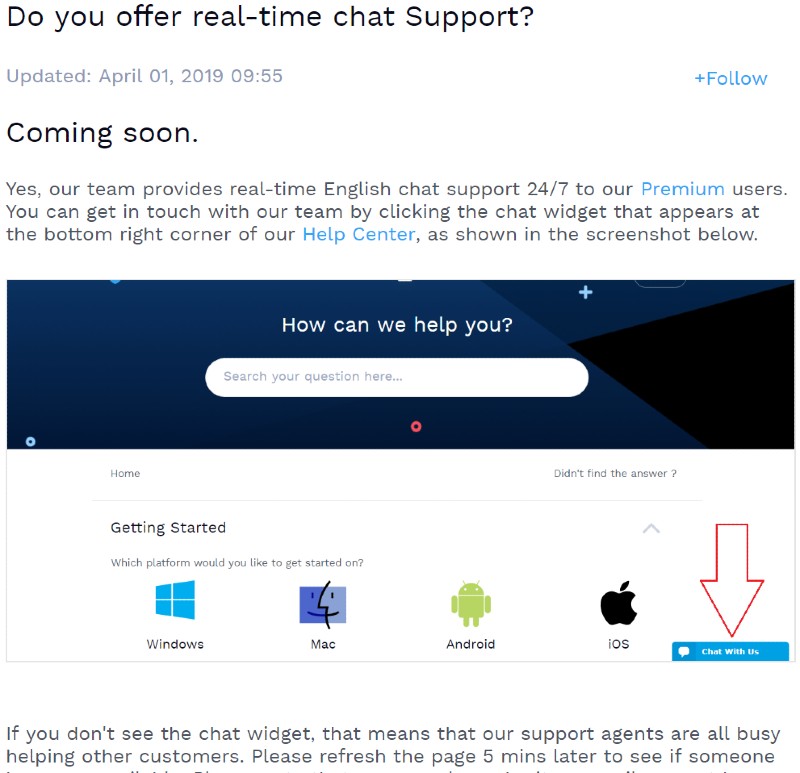
As a premium user, I should have access to live chat. I just need to refresh the support page until I see a chat option show up.
No biggie.
So I waited.
And waited.
And after over half an hour of checking every few minutes, I gave up. Because if it takes that long for a live chat to be available:
It sort of defeats the point of having a live chat.
I’ve checked the live chat on multiple days while using Hotspot Shield, and it’s never been available for me. I don’t know if they dropped the feature and didn’t tell anyone, or if I just have awful luck.
But nonetheless, the live chat feature is NOT reliable.
The good news?
The ticketing system IS reliable, and the articles are decent enough. So as long as you don’t prioritize having immediate support, you’ll still get good enough support.
I guess overall I consider Hotspot Shield’s customer support to be a little sub-par, but it’s not too bad.
I know, I know—it sounds like things are looking a little dimmer for Hotspot Shield.
Well…
Security and Privacy
I frequently say that security and privacy are, ironically, the most common downfall of top VPNs.
Most popular VPNs manage to perform well enough, are easy enough to use, and aren’t outrageously priced for what they offer.
But as a lot of users aren’t using VPNs for privacy as much as they’re using VPNs for accessing internet content, popular VPNs can get away with skimping on privacy and security.
I don’t want to spoil too much, but:
Hotspot Shield is one of the popular VPNs that finds some weaknesses here.
I was actually surprised—things were NOT as bad as I expected initially. But there’s still a bit to unpack.
The first thing I’d like to talk about is something that RELATES a lot to security and privacy, but isn’t wholly the same:
TRANSPARENCY.
You need this one to get a better reading on the others. And to be honest, I’ve been less than impressed with Hotspot Shield’s transparency.
For example—remember the thing I showed you at the very beginning? Their website dropped the phrase “650 million users.”
But later I found this:
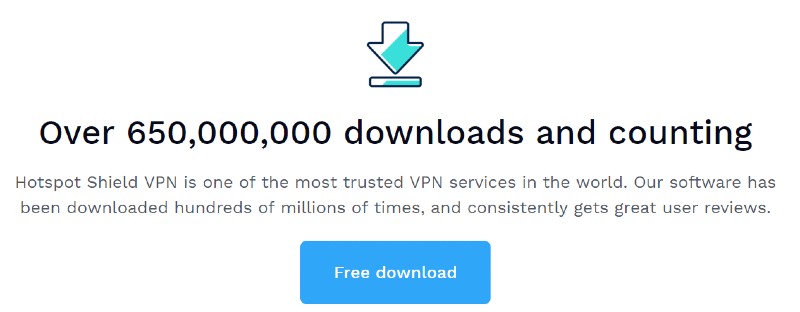
Which is a HUGE difference.
Now, is Hotspot Shield still one of the most popular VPNs in the game? Yeah. For sure.
But that opening figure is practically a LIE.
Now, I wouldn’t even bring it up if it wasn’t an issue in other areas…but it is:
Remember that Hotspot Shield has a free option.
I don’t automatically dismiss free VPN options…But it’s true that we should be cautious of them. And Hotspot Shield is a good example of why.
Check out the way they describe their free VPN:
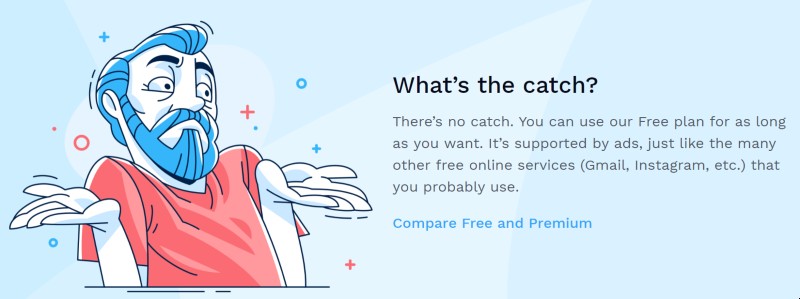
Let me rephrase the above message for you:
“There’s no catch, because this isn’t really a VPN!”
This sort of sets the tone for Hotspot Shield’s transparency and honesty.
Again, I DON’T dismiss free VPNs as immediately as a lot of other people do. BUT Hotspot Shield’s free VPN is clearly one of the free VPNs that everyone is cautious about.
Like all other VPNs, Hotspot Shield makes a big fuss about how secure and privacy-conscious it is.
Stuff like this actually HELPS Hotspot Shield’s case:
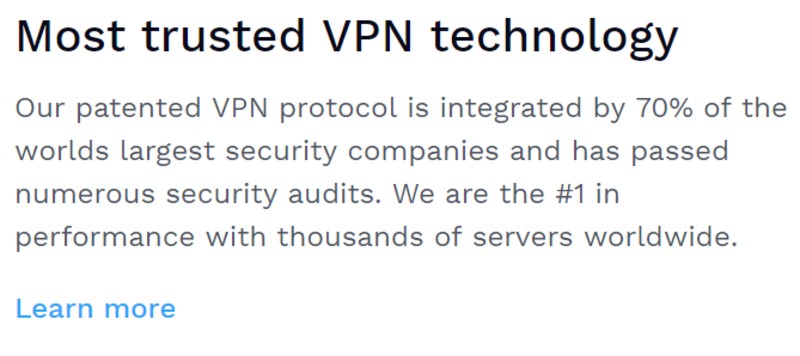
Hotspot Shield has passed security audits, which is a pretty big deal.
And that bit about the patented VPN protocol is pretty interesting:

I’m not a security EXPERT, so I can’t give you an expert opinion here.
The most I feel confident saying is that I view this with mixed feelings:
On the one hand, I can’t argue with Hotspot Shield’s results. It’s not just me—millions of people have found Hotspot Shield to perform phenomenally well.
Not to mention, apparently a lot of big security companies use that protocol. So it must be alright.
But on the other hand, replacing common protocols with a PROPRIETARY protocol without giving VPN customers a choice in the matter…it leaves a bad taste in my mouth.
Anyway, Hotspot Shield’s privacy practices also give me mixed feelings.
For example, Hotspot Shield says this:
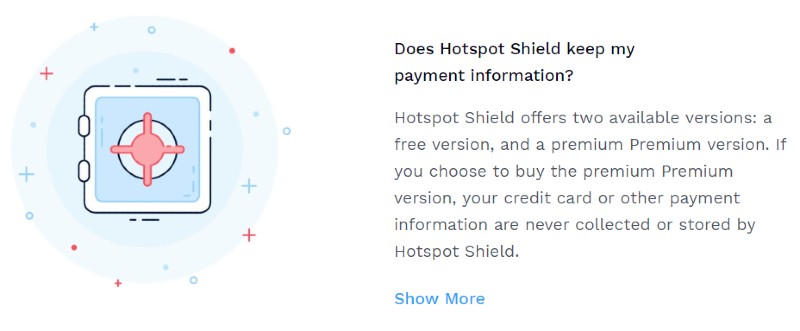
And to be COMPLTELY honest…I sort of don’t believe it.
Even very reputable VPNs will admit to logging payment information.
But if it’s true, that’s a GREAT practice.
You also get some limited malware protection:
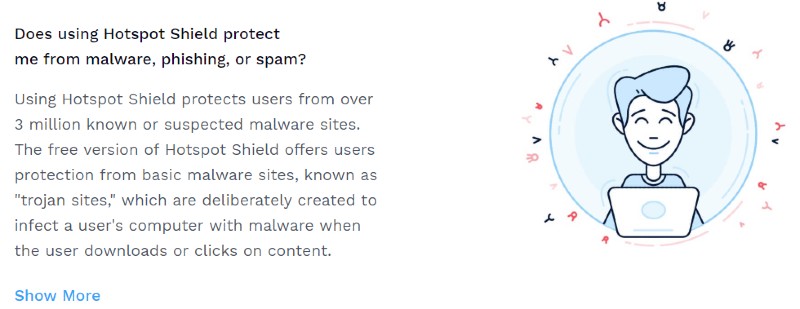
And, you DON’T have to make an account with Hotspot Shield, which is uncommon but great if you’re nervous about logging.
Although I suspect almost everyone will make an account to get the most out of Hotspot Shield.
So far, Hotspot Shield doesn’t seem too bad on security or privacy—nothing special, but still decent.
I think I might be about to rain on that parade.
But stuff like this is real important:

In early 2018, a researcher discovered a major weakness in Hotspot Shield’s security.
Without getting too technical, this was an information disclosure bug, and if pushed, it could reveal an individual user’s country and name of their WiFi network.
Which isn’t the most damning information, but it’s still more than what should be available.
And then there’s this:

Which in my view, is EXTREMELY serious.
The short version: The Center for Democracy and Technology is a nonprofit that focuses on internet freedom.
In the last half of 2017, it filed a formal complaint to the Federal Trade Commission regarding Hotspot Shield.
The CDT asked the Commission to investigate Hotspot Shield’s data sharing practices.
Why?
The CDT argued that Hotspot Shield violates its anonymous browsing promise:

Specifically, that Hotspot Shield intercepts and redirects some web traffic to partner websites—including advertisers.
Which would be a HUGE violation of everything VPNs are supposed to stand for AND the way they are supposed to work.
Now, I’ll be first to admit this is older news: the bug is from early 2018 and the CDT complaint is from August 2017.
But that doesn’t mean it’s not relevant. One bad headline could be bad luck. But two bad headlines that are BOTH compounded by research and confirmed by other parties…
Sorry, that’s not a good look for Hotspot Shield.
I know—how much more could I bash on Hotspot Shield?
This much more:

Hotspot Shield is headquartered in the United States.
While it’s true that a LOT of VPNs are located in countries guilty of mass surveillance practices or that enforce data retention laws, and that Hotspot Shield isn’t uniquely flawed here…
It’s still simply true that a VPN being headquartered in the United States may be subject to more scrutiny, forced legal compliance with surveillance, and outright hacking than VPNs in some other countries.
Now look, I don’t think Hotspot Shield is TERRIBLE. For many people, these security and privacy concerns are not too important.
And the truth is that even a faulty Hotspot Shield may be better than surfing the web unprotected.
But if your priority with a VPN is the privacy and security, I can’t honestly recommend Hotspot Shield.
Ouch…what a sour note. Don’t worry, here’s something nice to pick things up again:
Pros
- Hotspot Shield has GREAT performance, for normal internet use and streaming.
- There is a free option, although it’s limited.
- Hotspot Shield is SUPER easy to install and use.
- The software lets you access some quick help articles in-app—without ever using a browser.
Cons
- Difficulty torrenting.
- Hotspot Shield can be TOO easy and simple, to the point where you lose control over what you can do with the VPN. It also means you can’t make the most of its large server network.
- The features are bare-bones: this is a VPN for people who don’t care to have too much features and just want the basic VPN service.
- Although there are a lot of servers, there isn’t a huge number of countries/locations available.
- Unreliable live chat.
- Hotspot Shield has been credibly accused of logging and privacy policy malpractice, and of having a leak. Even if these issues have been fixed, it reflects poorly on the company.
- Words
Conclusion: Do I Recommend Hotspot Shield?
Let’s not jump ahead of ourselves here. I KNOW that pros and cons list looked like the cons won out.
But remember that they don’t matter equally to everyone.
Having said that, I can RULE OUT Hotspot Shield for quite a few people:
People who want more advanced VPNs—meaning VPNs that give you more features and settings, or even VPNs that let you control server choice better—will definitely NOT like Hotspot Shield.
And anyone who wants a VPN that’s strong on privacy and security has GOT to rule out Hotspot Shield.
And finally, people who need a torrent-friendly VPN might need to test Hotspot Shield more carefully on their own.
I found I couldn’t really torrent with Hotspot Shield, but some others have—go figure.
Now, who do I recommend Hotspot Shield FOR?
People who need SIMPLE and HIGH-PERFORMING VPNs will find Hotspot Shield to be perfect.
It’s relatively affordable, plus there’s the free option for people who need really quick solutions.
And though the torrenting and privacy may not be reliable, pretty much anything else you’d do using internet (including streaming) works fantastically.
And again, it’s incredibly easy to install and use on any platform.
So while I wouldn’t personally pay for Hotspot Shield long-term, I do know some people who would find it perfect. To each their own.
Not sure if it’s for you?
Don’t worry! As I’ve said, Hotspot Shield does offer a FREE plan that you can use indefinitely. Plus, you can purchase the real deal and get your money back within 45 days.
Enjoy!
Write your own review
Have you tried Hotspot Shield, or do you use it now? If so, was I too harsh on Hotspot Shield…or about consistent with your experience?
I’m always eager to hear from fellow VPN-enthusiasts, so let me know what you thought about Hotspot Shield below!

